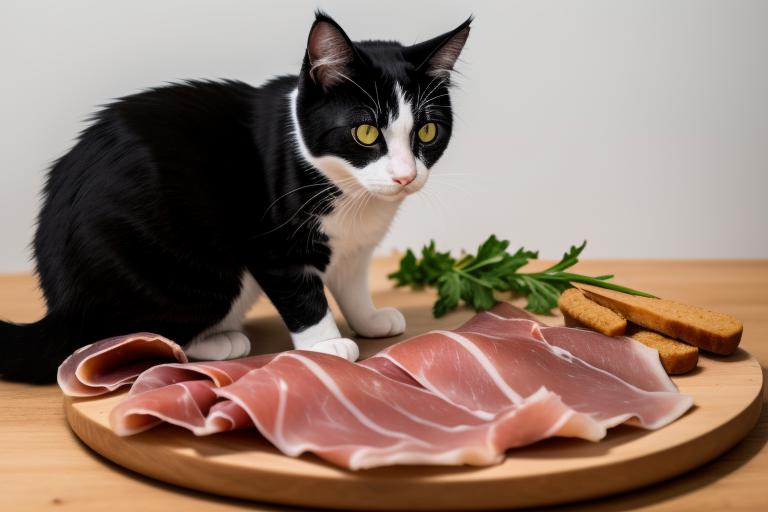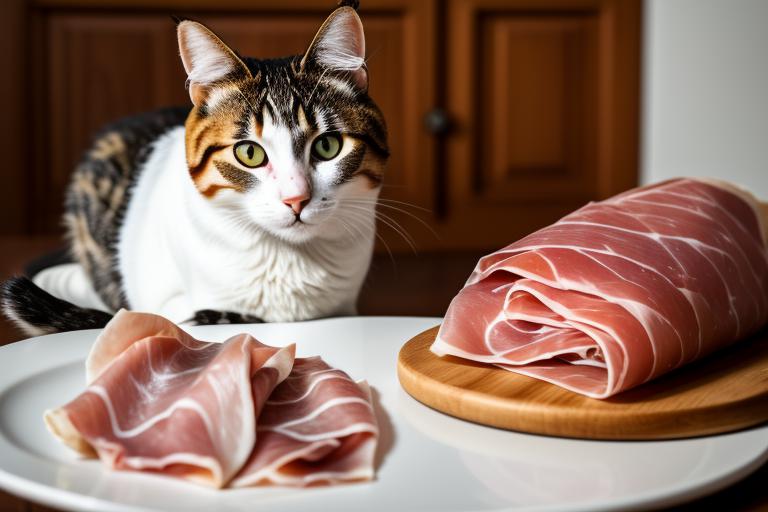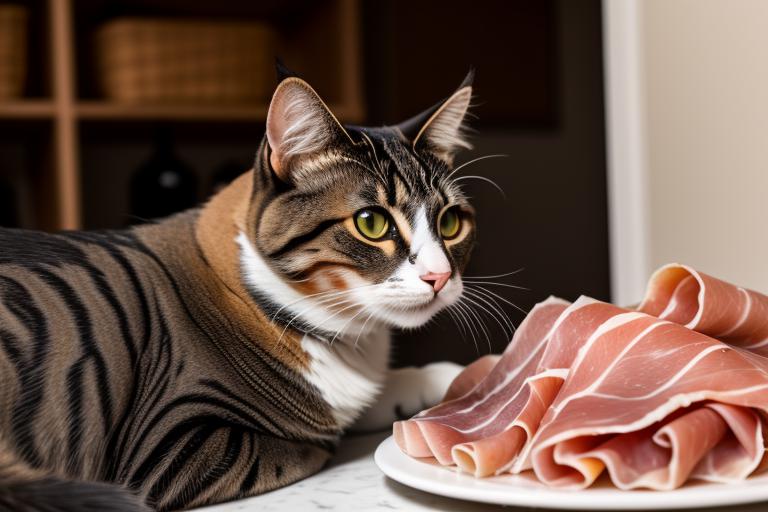Are you a devoted cat owner who loves to pamper your feline friend with the finest delicacies? Well, hold on to your hats because we’re about to unveil a culinary delight that might make your kitty’s whiskers tingle with anticipation.
But can cats really indulge in the exquisite flavors of prosciutto? Before you rush to the kitchen and unveil this gourmet treat, let’s delve into the world of feline nutrition and explore whether prosciutto is a purrfect addition to your cat’s menu.
Nutritional Value of Prosciutto for Cats

Prosciutto may be a delicious treat for you, but it’s important to know that it isn’t suitable for cats due to its high salt content. While cats are obligate carnivores and can consume some types of meat, prosciutto shouldn’t be included in their diet. Cats have different nutritional needs than humans, and excessive salt intake can lead to serious health issues for them.
Cats require a balanced diet that consists mainly of animal protein, along with some essential nutrients like vitamins and minerals. Prosciutto, being a cured meat, is heavily salted during the curing process. The high salt content in prosciutto can disrupt the delicate electrolyte balance in a cat’s body, leading to dehydration and other complications. Additionally, excessive salt intake can put a strain on a cat’s kidneys, which may already be sensitive due to their naturally low thirst drive.
It is crucial to prioritize your cat’s health and well-being by providing them with appropriate and specially formulated cat food. This ensures that they receive all the necessary nutrients in the right proportions. If you want to treat your cat, there are plenty of safe options available, such as commercially available cat treats specifically designed to meet their dietary requirements.
Potential Risks of Feeding Prosciutto to Cats
Before you decide to feed your cat prosciutto, it’s important to be aware of the potential risks involved.
Prosciutto is high in sodium and fat, which can lead to health implications such as obesity and heart problems in cats.
Additionally, cats may struggle to digest the cured meat, resulting in digestive issues like diarrhea or vomiting.
Health Implications
Feeding your cat prosciutto can pose potential health risks that you should be aware of. While cats are obligate carnivores and require a meat-based diet, certain meats can be harmful to their health.
Prosciutto, a type of cured ham, is high in fat, sodium, and preservatives, which can be detrimental to your feline friend. Excessive consumption of prosciutto can lead to digestive issues like diarrhea, vomiting, and pancreatitis.
The high sodium content in prosciutto can also cause dehydration and kidney problems in cats. Additionally, the preservatives used in curing prosciutto, such as nitrates, can be toxic to cats and may lead to health complications.
It’s best to avoid feeding prosciutto to your cat and opt for healthier, cat-friendly protein sources instead.
Digestive Issues
Excessive consumption of prosciutto can have potential risks for cats, particularly in relation to their digestive health. Cats have a delicate digestive system that isn’t equipped to handle certain foods, and prosciutto falls into this category.
Prosciutto is a cured meat that’s high in sodium and fat, which can be difficult for cats to digest. Consuming prosciutto can lead to digestive issues such as upset stomach, diarrhea, and vomiting in cats. The high salt content in prosciutto can also cause dehydration in cats, further exacerbating their digestive problems.
It’s important to keep in mind that cats are obligate carnivores and their digestive system is designed to process meat, but not processed or cured meats like prosciutto. Therefore, it’s best to avoid feeding prosciutto to cats to prevent any potential digestive issues.
Digestive Issues and Prosciutto Consumption in Cats
If you’re considering giving your cat prosciutto, it’s important to be aware of the potential digestive issues it can cause.
Cats have a sensitive digestive system, and consuming prosciutto can lead to upset stomach, diarrhea, or vomiting.
It’s crucial to prioritize your cat’s health and avoid feeding them foods that can potentially harm their digestion.
Digestive Concerns in Cats
When considering the digestive concerns of cats, it’s important to be aware of the potential effects of consuming prosciutto. While prosciutto may be a delicious treat for humans, it can pose several risks to your feline friend’s digestive system. Here are three key concerns to keep in mind:
- High sodium content: Prosciutto is known for its high salt content, which can lead to dehydration and kidney problems in cats.
- High fat content: The excessive fat in prosciutto can cause digestive upset, including diarrhea and pancreatitis in cats.
- Seasonings and additives: Prosciutto is often cured with various spices and additives, such as garlic or onion powder. These ingredients are toxic to cats and can cause gastrointestinal irritation and even damage.
To ensure your cat’s digestive health, it’s best to avoid feeding them prosciutto altogether. Stick to cat-friendly treats and foods specifically formulated for their dietary needs.
Risks of Feeding Prosciutto
Feeding your cat prosciutto can pose significant risks to their digestive system. Cats are obligate carnivores, meaning they require a diet primarily consisting of meat. While prosciutto is a type of meat, it’s high in fat and sodium, which can lead to digestive issues in cats.
Consuming prosciutto can cause stomach upset, diarrhea, and vomiting in cats, as their digestive systems aren’t equipped to handle such rich and fatty foods. Additionally, the high salt content in prosciutto can lead to dehydration and electrolyte imbalances in cats.
It’s important to remember that even small amounts of prosciutto can be harmful to your feline friend. To ensure your cat’s health and well-being, it’s best to avoid feeding them prosciutto altogether.
Sodium Content in Prosciutto and Cats’ Health

Prosciutto contains a high amount of sodium, which can be harmful to a cat’s health. While cats are obligate carnivores and can consume meat, it’s important to be mindful of the sodium content in certain foods.
Here are three reasons why the sodium content in prosciutto can be detrimental to your cat’s well-being:
- Sodium overload: Prosciutto is known for its rich and savory flavor, but it’s also packed with sodium. Cats have a low tolerance for excessive sodium intake, and consuming prosciutto can lead to an overload of sodium in their system.
- Kidney problems: Cats are prone to kidney issues, and a high-sodium diet can exacerbate these problems. Excessive sodium consumption can put strain on their kidneys, potentially leading to kidney damage or failure.
- Dehydration risks: Sodium has a dehydrating effect on the body. Cats naturally have a low thirst drive, and increased sodium intake can further decrease their water intake. This can lead to dehydration, which can have serious consequences on their overall health.
Given these risks, it’s best to avoid feeding prosciutto to your feline friend. Stick to a balanced and specially formulated diet that meets their nutritional needs to ensure their long-term health and well-being.
Prosciutto and the Risk of Foodborne Illness in Cats
To keep your cat healthy, it’s important to be aware of the potential risk of foodborne illness associated with prosciutto consumption. While prosciutto may be a delicious treat for us humans, it can pose serious health risks to our feline friends.
Prosciutto is a type of cured meat, typically made from pork, and it’s often consumed raw or undercooked. This means that it may contain harmful bacteria such as Salmonella or Listeria, which can cause food poisoning in cats.
Cats have a more sensitive digestive system compared to humans, making them more susceptible to foodborne illnesses. Consuming prosciutto can lead to symptoms such as vomiting, diarrhea, abdominal pain, and loss of appetite in cats. In severe cases, it can even result in dehydration and organ damage.
It is crucial to remember that even a small amount of prosciutto can be harmful to your cat. Therefore, it’s best to avoid feeding prosciutto to your feline companion altogether. Instead, stick to a balanced diet of specially formulated cat food that meets all their nutritional needs.
If you suspect that your cat has ingested prosciutto or is showing any signs of foodborne illness, it’s essential to seek veterinary care immediately. Your veterinarian can provide the necessary treatment and help your cat recover from any potential health issues caused by prosciutto consumption.
Alternatives to Prosciutto for Treating Your Cat
Looking for a safe and tasty alternative to prosciutto for treating your cat? While prosciutto may not be suitable for feline consumption due to its high salt and fat content, there are plenty of other options that can satisfy your cat’s taste buds without compromising their health.
Here are three alternatives that your cat will surely love:
- Cooked Chicken: Cats are carnivores, and cooked chicken is an excellent source of lean protein for them. You can boil or bake the chicken and then shred it into small, bite-sized pieces. Your cat will enjoy the tender texture and delicious taste of chicken.
- Tuna: Tuna is another protein-rich option that cats find irresistible. You can offer your cat canned tuna in water as an occasional treat. Just make sure to choose tuna that’s specifically labeled for feline consumption and avoid any tuna that contains added salt or seasonings.
- Freeze-Dried Meat Treats: Freeze-dried meat treats are a convenient and healthy alternative to prosciutto. These treats are made from real meat, without any added preservatives or fillers. They come in various flavors like chicken, turkey, or fish, which can cater to your cat’s preferences.
Frequently Asked Questions
Sure! Cats should not eat any type of cured meats, including prosciutto. Cured meats are high in sodium and fat, which can be harmful to cats. Stick to a balanced diet specifically formulated for feline needs.
Eating prosciutto can be dangerous for cats. The high salt content can cause health issues like dehydration and kidney problems. It’s best to avoid giving any amount of prosciutto to your feline friend.
Feeding cats prosciutto can worsen specific health conditions. It’s important to note that certain medical issues, such as pancreatitis or obesity, could be aggravated by consuming prosciutto.
It’s not safe to give cats prosciutto as a treat. Prosciutto is high in salt and fat, which can lead to health issues like pancreatitis and obesity. Stick to cat-friendly treats instead.
Feeding prosciutto to your cat could lead to long-term health issues. It may contain high levels of sodium and fat, which can cause problems like obesity, high blood pressure, and kidney issues.
Conclusion
In conclusion, while cats may enjoy the taste of prosciutto, it isn’t recommended to feed it to them due to potential health risks.
Prosciutto is high in sodium and can cause digestive issues in cats. Additionally, there’s a risk of foodborne illness associated with feeding them this cured meat.
It’s best to stick to cat-friendly alternatives for treating your feline friend.

